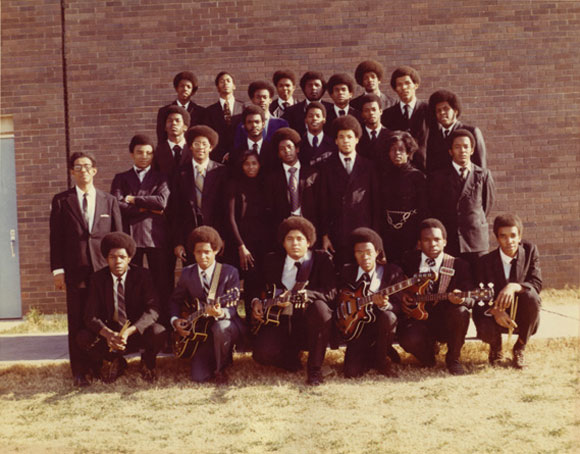Thunder Soul

Kashmere Stage Band. Photo courtesy Snoot Entertainment.

You’re more likely to hear the names Nile Rodgers and Bootsy Collins in discussions of funk music, than you would Conrad O. Johnson. Born in 1915, and a graduate of Wiley College in Marshall, Texas, he would go on to perform with Illinois Jacquet, Arnett Cobb, even Count Basie. Yet he decided to forego a career in jazz for family and a stable job, teaching in Houston’s Kashmere Gardens district. He joined the faculty of Kashmere High, and, inspired by an Otis Redding concert in 1967, at the ripe, young age of 55 formed the Kashmere Stage Band—a jazz-funk ensemble.
The movie tells the story of Mr. Johnson—”Prof” as the students called him—and KSB’s rise to international prominence in the mid-1970’s, as one of the best high school bands from the United States. The compositions and arrangements were done by Prof himself; at least fifty were sold to other high school band ensembles to help fund their tours. Neither Houston nor the music teaching community of the time was attuned to the needs or interests of the black community. Yet, Prof wanted his students to shine on stage in a way that evoked class, like the Duke Ellington Orchestra. Prof told his students they were entirely capable of playing at a professional level, and under his direction they did just that.
Even Governor George Wallace could not stop the locomotive from picking up steam: They performed in Mobile, Alabama, at the height of his segregationist platform. Though it’s never stated explicitly in the film, a competition at Dover High School, Arkansas, is nearly lost to racism. The judges deliberated for more than an hour, Prof refusing to allow them to declare a tie just to satisfy their prejudices. The band would go on to play Europe and Japan in 1977, where tastes have historically been more eclectic and progressive than the conservative, monochromatic populist-driven spectrum of American music.
Now 92 years old, Prof is given a gift by his former students thirty-five years later: A reunion performance of the Kashmere Stage Band. Some of them haven’t played in three decades, but all have come together to endure weeks of grueling rehearsal to make it happen for the man who inspired them to transcend their surroundings and transport their audience. These men and women are of a generation whose parents fought for civil rights, bestowing their children opportunities they would never have. Rather than be marginalized, they honored their forebears, with inspiration from the likes of James Brown, The Bar-Kays and Sly and the Family Stone—each of whom, like the KSB, have been resurrected by disc jockeys through copious sampling and remixing of their rhythm section.
The reunion could have been a dissatisfying third act, but they “take it to letter H,” as reunion organizer Reginald “Rollo” Rollins declares. Now in their fifties, their joints may be rusty, but their notes aren’t. Their purpose, critical at this juncture when arts and music programs are being cut at public schools across the nation, is emphasized by shots of youths playing outside the school and others watching—mouths agape—their performance inside the auditorium. With the airwaves and internet jam-packed with sonically-inferior, poorly-engineered recordings, it’s highly unlikely that today’s students have heard notes this pitch-perfect without auto-tune, timing so precise without sequencers. High schoolers today were born in the 1990’s, a decade that saw hip-hop devolve into product placement, rock into three-chord monotony, and gave rise to the internet and the proliferation of off-the-shelf digital recording—making it possible to rise above anonymity without one shred of technical or musical competence.
But there is hope. UC Davis graduate Joshua Paul Davis, a.k.a. DJ Shadow, has been sampling Kashmere Stage Band’s syncopated rhythms in his mixes. Several recordings by the Kashmere Stage Band were recently re-issued by Eothen Alapatt, a.k.a. Egon, General Manager of Stones Throw Records. If there is a punchline to all this, it’s that iTunes will introduce today’s youth to breakbeats and rhythms they never would have conceived possible without the use of a drum machine.
Thunder Soul premiered in March at the South By Southwest Film Festival in Austin, TX, and was exhibited this past week at the 2010 Dallas International Film Festival.
 Kashmere Stage Band • Dolby® Digital surround sound in select theatres • Aspect Ratio: 1.85:1 • Running Time: 83 minutes • MPAA Rating: Not Rated
Kashmere Stage Band • Dolby® Digital surround sound in select theatres • Aspect Ratio: 1.85:1 • Running Time: 83 minutes • MPAA Rating: Not Rated